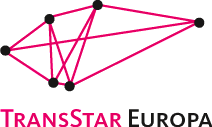On three consecutive days participants of the EU-funded project TransStar Europe read texts by contemporary authors telling their story of life in present-day Europe. It is a story about identity and homelessness, social dislocation, alienation, new beginnings, of borders and the way they shift or are violated.
Thursday, 13 March, 3:00 – 4:00 p.m.
TransStar reading at the Croatian Stand (I) – Surrelistic Stuff
Magda Wlostowska and Katharina Kowarczyk read excerpts from:
Return of the Old Komodo Dragon by Michael Ajvaz (Czech Republic) translated by Katka Ringesová
The Two-Gigabyte Stick by Yuriy Izdryk (Ukraine) translated by Constanze Aka
Bestiarium by Tomasz Różycki (Poland) translated by Marlena Breuer
Ballad(yna)s and Romances by Ignacy Karpowicz (Poland) translated by Katharina Kowarczyk
Location: Stand of the Croatian Ministry of Culture, Hall 4, D 402
Friday, 14 March, 2:00 – 3:00 p.m.
Book Presentation and Discussion: Majdan! Ukraine, Europa
The Ukrainian authors Serhiy Zhadan (Kharkiv) and Oksana Forostyna (Kiev) will introduce the edited volume Majdan! Ukraine, Europa and will discuss the current situation in Ukraine.
Reading and discussion with Serhiy Zhadan (author from Kharkiv, Ukraine) and Oxana Forostyna (author and sociologist from Kiev, Ukraine).
Moderation: Claudia Dathe, EU-funded project TransStar Europe (Tübingen)
Location: Stand of the Ukrainian Publishers and the Lviv Book Forum, Hall 4, E 506
Friday, 14 March, 3:00 – 4:00 p.m.
TransStar Reading at the Croatian Stand (II) – European History as Family History
Sofia Onufriv, Maja Konstantinović and Martina Lisa read excerpts from:
Zinandali by Myroslav Dokhynez (Ukraine) translated by Nina Hawrylow
Who gives a fuck about a thousand dinars now by Boris Dežulović (Croatia) translated by Maja Konstantinović
Germans: Geography of Loss (Czech Republic) by Jakuba Katalpa translated by Martina Lisa
Location: Stand of the Croatian Ministry of Culture, Hall 4, D 402
Saturday, 15 March, 3:00 – 4:00 p.m.
TransStar readings at the Croatian Stand (III) – European History as a History of Memory
Franziska Mazi and Maja Konstantinović read excerpts from:
The Teapot and the Chinese Emperor by Dzwinka Matiyash (Ukraine) translated by Constanze Aka
Gulasz z turula by Krzysztof Varga (Poland) translated by Melanie Foik
Roses by Stanja Hrastelj (Slovenia) translated by Tjaša Šket
Location: Stand of the Croatian Ministry of Culture, Hall 4, D 402
Sunday, 16 March, 11:00 a.m. – 12:00 p.m.
Recounting European History – Literary Perspectives from Five Countries
How do authors recount their history in present day Europe? A history that is influenced by societal, social and economic transitions, by changing ideologies and indescribable individual fates. Their texts portray people in the midst of violence and indifference, alienation and constriction, confrontation and despair, generating a mosaic of European biographies in the 20th and 21st centuries.
Martina Lisa, Christian Nastal and Schamma Schahadat from the EU-funded project TransStar Europe will introduce Daniel Odija, read text excerpts and will provide insight into transcultural entanglements of the old continent.
Reading and discussion with Daniel Odija (Poland), Christian Nastal, Martina Lisa and Schamma Schahadat (TransStar Europe)
Moderation: Claudia Dathe, TransStar Europe (Tübingen)
Location: Forum OstSüdOst, Hall 4, E 505
Sunday, 15 March, 12:00 – 1:00 p.m.
Book Presentation and Discussion: Majdan! Ukraine, Europe
Together with Rebekka Harms, a politician from the German Green Party, the Ukrainian writers Natalka Sniadanko and Serhiy Zhadan will present the book Majdan! Ukraine, Europa and will discuss the current political situation in the country.
Reading and discussion with Serhiy Zhadan (Kharkiv), Natalka Sniadanko (Lviv), Rebekka Harms (Brussels)
Moderation: Sofia Onufriv, TransStar Europe (Berlin)
Location: Forum OstSüdOst, Halle 4, E 505


